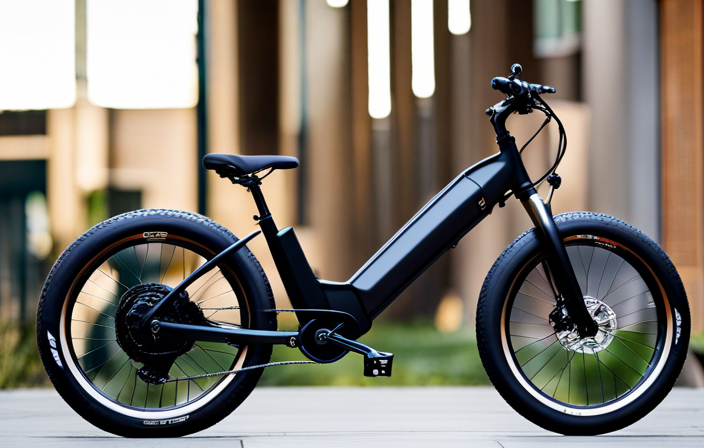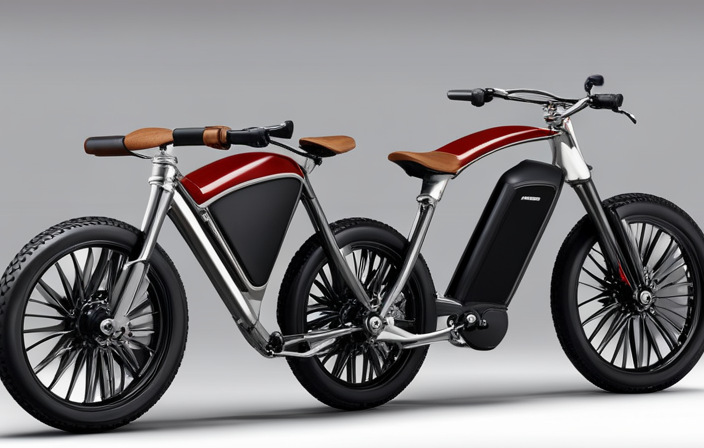You’ve made the choice to embrace the electric bike wave, yet before making your decision final, there are several factors you need to think over. Among these, the cost of charging an e-bike is an important aspect to consider.

E-bikes can save you a lot of money when it comes to commuting and getting around town, but what will it cost in terms of electricity charges? How long do charge times typically last and how much electricity does an average ride consume?
In this blog post, we’ll answer all your pressing questions about charging an e-bike so that you can make an informed decision on whether or not this type of transportation is right for you.
Cost of About $0.13 per Kilowatt-Hour (kWh)
| E-Bike Battery Capacity (Ah) | Voltage (V) | Energy (Wh) | Energy (kWh) | Cost to Charge from 0 to 100% |
|---|---|---|---|---|
| 10 | 36 | 360 | 0.36 | $0.05 |
| 10 | 48 | 480 | 0.48 | $0.06 |
| 15 | 36 | 540 | 0.54 | $0.07 |
| 15 | 48 | 720 | 0.72 | $0.09 |
| 20 | 36 | 720 | 0.72 | $0.09 |
| 20 | 48 | 960 | 0.96 | $0.12 |
| 25 | 36 | 900 | 0.9 | $0.12 |
| 25 | 48 | 1200 | 1.2 | $0.16 |
Cost of About $0.25 per Kilowatt-Hour (kWh)
| E-Bike Battery Capacity (Ah) | Voltage (V) | Energy (Wh) | Energy (kWh) | Cost to Charge from 0 to 100% |
|---|---|---|---|---|
| 10 | 36 | 360 | 0.36 | $0.09 |
| 10 | 48 | 480 | 0.48 | $0.12 |
| 15 | 36 | 540 | 0.54 | $0.14 |
| 15 | 48 | 720 | 0.72 | $0.18 |
| 20 | 36 | 720 | 0.72 | $0.18 |
| 20 | 48 | 960 | 0.96 | $0.24 |
| 25 | 36 | 900 | 0.9 | $0.23 |
| 25 | 48 | 1200 | 1.2 | $0.30 |
Cost of About $0.35 per Kilowatt-Hour (kWh)
| E-Bike Battery Capacity (Ah) | Voltage (V) | Energy (Wh) | Energy (kWh) | Cost to Charge from 0 to 100% |
|---|---|---|---|---|
| 10 | 36 | 360 | 0.36 | $0.13 |
| 10 | 48 | 480 | 0.48 | $0.17 |
| 15 | 36 | 540 | 0.54 | $0.19 |
| 15 | 48 | 720 | 0.72 | $0.25 |
| 20 | 36 | 720 | 0.72 | $0.25 |
| 20 | 48 | 960 | 0.96 | $0.34 |
| 25 | 36 | 900 | 0.9 | $0.32 |
| 25 | 48 | 1200 | 1.2 | $0.42 |
Cost of About $0.40 per Kilowatt-Hour (kWh)
| E-Bike Battery Capacity (Ah) | Voltage (V) | Energy (Wh) | Energy (kWh) | Cost to Charge from 0 to 100% |
|---|---|---|---|---|
| 10 | 36 | 360 | 0.36 | $0.14 |
| 10 | 48 | 480 | 0.48 | $0.19 |
| 15 | 36 | 540 | 0.54 | $0.22 |
| 15 | 48 | 720 | 0.72 | $0.29 |
| 20 | 36 | 720 | 0.72 | $0.29 |
| 20 | 48 | 960 | 0.96 | $0.38 |
| 25 | 36 | 900 | 0.9 | $0.36 |
| 25 | 48 | 1200 | 1.2 | $0.48 |
Here’s how the numbers above are calculated:
- Energy in watt-hours (Wh) is calculated as the product of battery capacity in ampere-hours (Ah) and voltage (V).
- Energy in kilowatt-hours (kWh) is calculated by dividing the energy in watt-hours by 1,000.
- Cost to charge from 0 to 100% is calculated by multiplying the energy in kilowatt-hours by the cost of electricity per kilowatt-hour.
All tables above assume you’re charging the battery from completely empty to completely full. In practice, it’s generally better for the longevity of the battery to avoid letting it get completely empty or charging it fully every time.
What Is An E-Bike?
An e-bike (or electric bike) is a bicycle that has an integrated electric motor. This motor assists the rider in propelling the bicycle forward and increases the range of travel for those who don’t want to (or can’t) pedal. There are several different types of e-bikes, from traditional road bikes with an electric assist, to mountain bikes and commuter ebikes. Some ebikes even have a removable battery pack for ultimate convenience.

Overall, ebikes provide a great way to enjoy all the benefits of cycling without having to pedal as hard or as far as you would on a traditional bike. They also make it easier to tackle steep hills or easily ride over longer distances!
The cost of charging an e-bike depends on several factors such as battery capacity, energy efficiency, voltage and other components like motors and batteries which can make up around 70% of the overall price. On average, it could cost anywhere from 10 cents to 28 cents per charge depending on your location and electricity rate but could still be much less expensive than riding cars or buses in some cases!
How Much Does It Cost To Charge An Electric Bike?
Charging an electric bike can be expensive, depending on your battery type and charging components. On average, a low-end Fiido electric bike with a 36V 10Ah lithium battery would cost around $1.50 to charge fully from empty. A more powerful e-bike with a 48V 20Ah lithium battery could cost around $3 per full charge.
The overall cost also depends on how much riding range you need and how often you use your e-bike. If your daily commute is only 5 miles each way, then it might not be worth getting an expensive motor and big batteries, as that would add to the overall cost of ownership as well as charging costs.

It’s important to keep in mind that even if you’re using high powered components for long rides, if you still ride your e-bike conservatively and don’t drain the battery too frequently, then your charging costs will remain fairly affordable over the years.
Charge time can vary greatly depending on the power output of the chargers used — most mid-range e-bikes will take 4–5 hours to fully charge, while more advanced mountain bikes may require up to 8 hours or longer before they are ready for another ride!
Charging Time
When it comes to electric bikes, the charging time depends on a few factors. One of the most important factors is the battery capacity – the more powerful your bike’s battery, the longer it will take to charge. E-bikes typically come with batteries ranging from 250Wh to 1200Wh, and they can take anywhere between 2-6 hours to fully charge depending on their capacity.
It’s also important to consider how much energy you’re using when riding your e-bike as this will affect how quickly it needs recharging. For example, if you’re going up steep hills or carrying a lot of weight in your basket then you’ll naturally use more energy which means that you’ll need to recharge more frequently. On average, an electric bike could get around 30 miles per full charge but this number could be higher or lower depending on how hard you’re pushing those components!
Finally, it’s worth noting that some models are designed for fast charging – these mostly involve removing and replacing the internal battery so they tend to be quite expensive compared with regular ebikes but still cheaper than buying multiple chargers!
Charging Cost
When it comes to charging an e-bike, the cost depends on multiple factors such as battery size, cycling range, and local electricity rates. On average, you could expect to pay around 10 cents per mile if you’re riding a bike with a small battery (around 12 volts) and up to 30 cents per mile for bikes with larger batteries.
The cost of charging a Fiido electric bike will vary depending on the battery capacity and voltage. For example, a 36V 20Ah electric bike would need 2 hours to be fully charged at a rate of 6 amps. Charging this e-bike can cost between 24 – 48 cents depending on local electricity rates.
Overall, the amount of money you spend on charging your e-bike will depend heavily on how much energy your motor needs in order to move its components (the weight of the frame, rider weight etc). That said, there are still some tips that can help reduce your costs over time; from using solar chargers or power strips during off peak hours so you don’t have to draw too much juice from the grid when prices are highest. By following these simple tips you could see a significant reduction in your overall charging costs!
How To Calculate The Cost Of Charging An Electric Bike
Calculating the cost of charging an e-bike is important, particularly if you’re trying to minimize your overall costs. Fortunately, it’s not too difficult to figure out how much it will cost you. Here are the steps you need to follow in order to calculate the cost of charging your electric bike:
Step 1: Calculate The Battery Capacity – The capacity of a battery is measured in Watt-hours (Wh). This number tells you how much energy can be stored inside a battery before needing to be recharged. Knowing this number will help you determine the amount of time and electricity needed for each charge.
Step 2: Calculate The Charging Time – With the battery capacity known, we can now calculate how long it will take to charge up an empty battery. Most e-bikes use 36V or 48V batteries, so depending on which voltage your bike uses, divide by 10 or 15 respectively when calculating charging time. For example, if your e-bike has a 300 Wh battery pack with a 48V system then it’ll take around 20 hours (300 / 15) for a full charge from empty.
Step 3: Calculate The Cost Of Electricity – Once we know how long our bike needs to charge for each cycle, we can estimate the total cost with reference to local utility rates and usage restrictions that may apply in certain regions/states/countries. On average most countries pay around 12 cents per kWh while some states like Hawaii and Alaska often have higher rates due to location factors such as remoteness or lack of terrestrial power generation plants. Taking this into account, let’s say our hypothetical 300 Wh 48V bike takes 20 hours at 12 cents per kWh; doing some simple math shows us that we would spend $3.60 every time this particular e-bike was fully charged from empty ($3.60 = [20 x 0 .12]).
Conclusion
In summary, electric bike owners need to factor in the cost of electricity when charging their bikes. The average cost is around 12 cents per kWh, however this can vary depending on local utility rates and usage restrictions that may apply in certain regions or countries.
For example, states like Hawaii and Alaska generally have higher rates due to location factors such asile and Peru may have more expensive electricity due to their power infrastructure. Knowing the cost of electricity in your location is important when it comes to calculating the total cost of running an electric bike.
A hypothetical 300Wh 48V e-bike would cost $3.60 each time it was charged from empty, assuming a rate of 12 cents per kWh andile and may have more expensive electricity due to their power infrastructure.
Charge an E-Bike FAQ
What does it cost to charge an e-bike?
The cost to charge an e-bike varies depending on the type of battery and charger used, as well as the local electricity rate. Generally speaking, it costs between $0.02 and $0.08 per mile travelled by electric bike, depending on how much power is used when riding. This can be a great way to save money on transportation costs, as charging an electric bike is significantly less than fueling a car for the same distance. Additionally, many e-bike chargers offer discounts for purchasing electricity during off-peak hours or when using renewable energy sources. With a little research and some smart planning, it is possible to keep your electric bike battery charged and ready to ride without breaking the bank.
Finally, electric bikes are a great way to reduce your carbon footprint and help protect our environment. Using an electric bike instead of driving a car can significantly reduce emissions from fossil fuels and help create a cleaner, healthier planet for future generations to enjoy. As an added bonus, electric bikes are much more fun than traditional bicycles, so you’ll have plenty of time to enjoy the fresh air and sunshine while exploring your neighborhood!
With all the benefits that e-bikes offer, it’s easy to see why they are becoming increasingly popular. Electric bikes provide a convenient and affordable way for people to travel short distances that would otherwise take a long time on foot or by public transport. They are also great for those who want to reduce their reliance on cars and help the environment in the process. The most important thing is to make sure you choose an e-bike that meets your needs and fits your budget, so don’t forget to research different models before making a final decision. With the right e-bike, you’ll be able to make the most of your ride and truly enjoy every journey!
How much does it cost to charge e-bike at home?
It typically costs around $0.15 to $0.20 per kilowatt-hour (kWh) to charge an e-bike at, depending on your local electricity rates. This means that the cost of charging up a typical e-bike battery of 500Wh would be between $7.50 and $10. A full charge of a typical e-bike battery would take around 4 to 6 hours.
Alternatively, if you are out and about and need to use public charging stations, it can cost anywhere from $1 to $4 for an hour of charging time. It is important to be aware of the pricing structure for different businesses as some may offer discounts frequent customers or cheaper “off peak” rates.
It is also possible to buy your own charger and install it in your own home. This will result in more reliable and quicker charging times, as well as reduced costs since you won’t have to pay per hour at public charging stations. The cost of buying a charger will depend on the make and model but typically range from $200 to over $1000. It is important to ensure you have the right type of charger for your vehicle and that it is installed by a professional electrician.
In addition, some areas also offer free or discounted charging options such as workplace charging or community charging programs. These can provide an effective way to charge your car at no cost, although availability will depend on location and provider.
It is important to do research beforehand to make sure you understand the different types of chargers available, the costs associated with each one, and possible discounts or free options in your area. With this knowledge you can select the best option for your needs while saving money in the long run.
How much electricity does an e-bike use?
The amount of electricity an e-bike uses depends on the battery size and type as well as how often it is ridden and at what speed. Generally, electric bikes can use between 250 watts to 1000 watts of power when in use. This translates to around 1-2 kWh per 100 kilometers (60 miles) which equates to roughly 8 cents per hour depending on the price of electricity in your region. Therefore, an average cost for recharging an electric bike would be around 20 cents for a full charge.
Should I charge my ebike every night?
It is generally recommended that you charge your electric bike every night in order to keep the battery at its peak performance. This will ensure that you always have enough power when you need it, while also helping to extend the life of your battery. Charging overnight allows your battery to reach full capacity and prevents overcharging, which can reduce the lifespan of a battery significantly. It can also help save money in the long run as it reduces the amount of energy needed to get your ebike up and running each day. Additionally, keeping your electric bike fully charged will help maximize its range and performance, providing you with an optimal riding experience.
How much does it take to charge an ebike?
The amount of time needed to charge an electric bike depends on several factors, such as the battery type and capacity, as well as the charger used. Generally speaking, it can take anywhere from 2-6 hours to fully charge an ebike battery. This range is due to different types of battery designs, which have varying charging requirements. Lithium-ion batteries typically take 2-4 hours to reach full capacity, while lead-acid batteries usually require 4-6 hours for a full charge. Additionally, some electric bikes have chargers that are specifically designed to provide faster charging times than standard chargers.
What is the lifespan of an electric bike battery?
The lifespan an electric bike battery will depend the type of battery and how is used, but generally most electric bike batteries last between 500 to 1,500 charge cycles. Li-ion batteries typically offer a higher lifespan than lead-acid, although usage habits can play a role in the overall life expectancy. Regular maintenance and proper charging techniques should be practiced to ensure your electric bike’s battery stays healthy and lasts as long as possible.
How long do ebike batteries last in hours?
The number of hours an ebike battery can last depends on the capacity of the battery, motor type and the terrain you are riding in. Generally speaking, a higher capacity battery will have a longer range than a lower capacity one. Ebikes with hub motors tend to be more efficient when it comes to battery life due to their low power consumption compared to mid-drive motors. On average, most ebikes with full charge can travel up to 40 miles on level terrain or 25 miles on hilly terrain. Depending on how much you ride and at what speed, your battery could last anywhere between 1-5 hours before needing a recharge.
What is the difference between fast chargers and standard chargers?
Fast chargers typically use higher voltages and currents to charge your battery quicker than standard chargers. They usually have a higher capacity and can charge your battery within an hour or two. On the other hand, standard chargers are slower, taking up to 6-8 hours to fully charge your battery. Fast chargers are more expensive compared to standard chargers but could be worth the investment if you’re short on time or don’t want to wait as long for a full charge.
What should I do if my battery runs low?
If your battery runs low while you’re out riding, it is best to find a charging station nearby so you can top up the power in your battery while you take a break. Alternatively, you could carry a power bank with you, which can provide a quick boost of power when your battery runs low. Power are small and portable, so’re easy to carry in your pocket or backpack while you’re out on the go.
How often should I charge my electric scooter?
It is recommended that you charge your electric scooter after every ride or at least once every couple of days. This will help ensure that your battery remains healthy and lasts for a long time.
When storing an electric scooter for long periods of time, it is also important to plug it in and charge it occasionally to prevent the battery from draining. It is best to consult the user manual included with your scooter for more information on how and when to charge the battery.
What happens if my electric scooter runs out of power?
If your electric scooter runs out of power, it will no longer be able to move itself, so you may need to push or carry it in order to reach a charging station. It is important to pay attention to the battery level indicator and make sure that you are charging your electric scooter regularly so that you don’t end up stranded without power.
If this does happen, some emergency measures can be taken such as turning off all unnecessary display features and lights to conserve energy. Additionally, try pedaling with your feet if possible while the motor is not engaged. This will help generate a small amount of electricity and can help get you back home.
Finally, try to stay in well-lit areas and carry a spare battery or an emergency charging cable if available. By taking the right precautions, you can ensure that your electric scooter stays powered up and ready to ride!
How far can a fully charged e-bike go?
The range of an electric scooter can vary greatly depending on factors such as the capacity of the battery, terrain, and speed. Generally speaking, a fully charged e-bike should be able to travel anywhere between 12 to 25 miles (19 – 40 km).
Factors such as wind resistance, hills, and weight of the rider can reduce this range significantly. It is important to remember that the range of an e-bike also depends heavily on how it is used – for example riding at higher speeds or carrying heavy loads may reduce the distance you are able to travel. Therefore, it is important to take into account all these factors when estimating your range.
Additionally, always make sure to bring a charger along so that you can recharge your vehicle when needed. It is also important to check the battery life before leaving your home, as many e-bikes come with an indicator that will tell you how much charge they have left. With these tips, you should be able to make the most out of your e-bike and enjoy a great riding experience. Happy cycling!
Do electric bikes save money?
Yes, electric bikes can save you money in the long run. Compared to gas-powered vehicles, they are more affordable to operate and maintain. Additionally, since they use less energy, they also help reduce your carbon footprint. Electric bikes will cost you an upfront price but they are a great way to save money in the long term if you decide to use them regularly.
Additionally, many stores are offering discounts and special promotions on electric bikes, making them even more affordable. So if you’re looking for an eco-friendly way to get around town, an e-bike could be a great option for you!
How long does a 1000-watt e-bike last?
A 1000W e-bike can last for up to five years or more with proper maintenance. Depending on the terrain and how often it is ridden, battery life may vary. Many brands offer warranties that cover the motor and battery, so it’s best to check with the manufacturer before making a purchase. With regular use and proper care, you can expect
Is it OK to charge an e-bike every day?
Yes, it is generally OK to charge an e-bike every day, as long as the battery life doesn’t diminish. Typically, most electric bikes have a built-in smart charger that will turn off automatically when the battery reaches capacity. To ensure a longer life for your e-bike’s battery, remember to use the right charging cable
Do Ebikes charge as you pedal?
No, electric bikes do not charge as you pedal. E-bikes come with built-in batteries that must be charged separately from the bike itself. Most e-bike batteries take up to 8 hours to recharge and will last between 20 and 80 miles depending on the battery type and rider weight. To maximize your e-bike’s battery life, remember to charge it regularly and avoid draining the battery completely. If necessary, you can buy additional batteries for your e-bike in order to extend your riding time. Additionally, some higher-end electric bikes feature regenerative braking systems which allow the rider to use their momentum to recharge the battery while going downhill or coasting.
Is it safe to charge an ebike battery in the house?
Yes, it is safe to charge an ebike battery in the house, as long as you follow safety protocols and ensure that the cord and charger are rated for indoor use. Make sure there are no combustible materials near the charging area and that you plug the charger into a surge protector or GFCI outlet. Additionally, avoid leaving your bike plugged in while unattended to prevent potential fires. Above all, be sure to read and follow the manufacturer’s instructions when charging your ebike battery.
What is regenerative braking?
Regenerative braking is a feature found on some high-end electric bikes that allows the rider to use their momentum to recharge the battery while riding. The bike’s motor is designed to act as a generator and use the motion of the wheels to generate electricity and store it in the battery, allowing for longer rides without needing to charge. This type of braking is more efficient than regular brakes, reducing wear on brake pads and increasing your range by up to 10%. It also enables smoother stops,









